Christ is risen!
AFTER DIVINE LITURGY: Dear parishioners and guests, after each Divine Liturgy, coffee and hard rolls are available in the church hall.
VIGIL LIGHT: This week vigil light is given to God and dedicated for all the deceased of the Waselik family offered by Family.
SVIACHENE: The traditional Easter parish “SVIACHENE” will be held on April 15. On that day we will have only ONE (1) Divine Liturgy at 10:30 a.m. We will be running a raffle. If you would like to donate any items to be raffled please give it to Anya Hanson. We ask to donate cakes for desert. Tickets are available through Luba Dubno. Tickets are: adults $20, youth between 12 to 16 $10, under 12 and altar boys and Ridna Shkola students free.
Ukrainian Women’s League of America-New Haven #108 is hosting a book review by Fr. Bohdan Prach, rector of the Ukrainian Catholic University in Lviv. Fr. Prach will provide a Ukrainian –language presentation of his new book, The Clergy of the Peremyshl Eparchy and the Apostolic Administration of Lemkivshchyna, on Tuesday, April 24 at 6:30 pm in St. Michael’s church hall, 569 George St., New Haven.
We will be making Pyrohy on April 21 to fill our orders. Please come and help. See Walter Ushchak as to how to volunteer.
KOVBASA: The Knights of Columbus Parish Council will be making fresh ¾ kovbasa and fried with one (1) pound of fresh cooked cabbage with a vegetable mix. A good meal for two people. These meals will be available when you pick up your pyrohys on April 21. The meals will cost $10.00. Please preorder to ensure that we make enough for everyone. Please call 203-789-9554 only and leave a message with your order.
KNIGHTS OF COLUMBUS: The Knights of Columbus Blessed Metropolitan Andrey Sheptytsky Ukrainian Council will hold its next regular meeting on Monday, May 7, at 7:00 p.m. in the church hall. All men of parish are invited to attend to see what the Knights are all about and what they do and what you can do with them for your parish.
MOTHER’S DAY BREAKFAST: The parish Traditional Mother’s Day Breakfast will be held on May 13, 2018 after the 9:00 Divine Liturgy (Only One Divine Liturgy) in our church hall. All women of our parish are invited. The breakfast is hosted, sponsored and served by the Knights of Columbus Parish council. We look forward to seeing you.
St. Basil Seminary invites young men ages 14 and older to a Open House that will be held on April 21st, 2018. The theme of this seminary is “COME and SEE”. For more information see the flyers at the entrance or call the rectory 203-865-0388.
ADULT RELIGIOUS EDUCATION: We are spearheading an effort to provide Adult Religious Education – Refresher courses to the members of the Parish. The basic plan outline is to provide an English Class after the English Divine Liturgy on Sunday and a Ukrainian class after the Ukrainian Divine Liturgy. The class will be offered once or twice a month. A curriculum is being formulated as we speak. We now turn to you the parishioners to tell us what topics you would like to see covered. We also invite you if you feel you have a topic that you would like to lecture on to bring it to my attention. I look forward to all of your suggestions, Father Iura
THIRD ANNUAL ST. GIANNA BENEFIT DINNER
St. Gianna Pregnancy Resource Center (180 Sherman Ave., Suite B, New Haven) will host its annual benefit dinner ”Babies in Bloom” on Sunday, April 29 from 1-5 p.m. at Amarante`s Sea Cliff in New Haven. Tickets are $45 and include appetizers, a buffet dinner, desert and soft drinks. Our speaker and honoree, Christian Slattery, is the organizer of the first pregnancy crisis center in NYC. This is the busiest center in NY at this time. Also being honored, is the pro-life Choose Life at Yale(CLAY) organization that founded the Vita et Veritas Conference to bring a bigger message of pro-life to Yale. Reservations may be purchased online at www.giannacenter.org or by sending in a check payable to “St. Gianna Pregnancy Resource Center” and mailed to POBox 8966 New Haven, CT 06532.
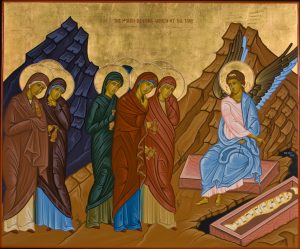 This Sunday presents us with the proclamation of the resurrection according to St. Mark.
This Sunday presents us with the proclamation of the resurrection according to St. Mark.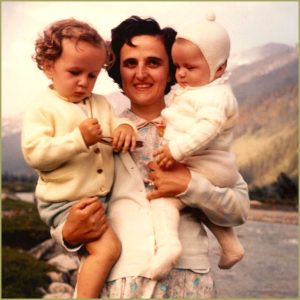 Join us for the St Gianna Benefit Dinner
Join us for the St Gianna Benefit Dinner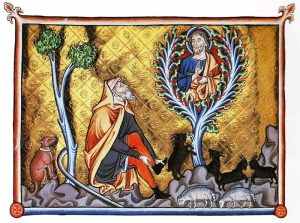 When God appeared to Moses, he first spoke to him from the burning bush. “There the angel of the Lord appeared to him as fire flaming out of a bush. When he looked, although the bush was on fire, it was not being consumed. So Moses decided, “I must turn aside to look at this remarkable sight. Why does the bush not burn up?” (Exodus 3:2-3). Later God was to tell Moses on Mount Sinai, “But you cannot see my face, for no one can see me and live” (Exodus 33:20). Indeed, the Epistle to the Hebrews declares, “our God is a consuming fire” (Hebrews 12:29).
When God appeared to Moses, he first spoke to him from the burning bush. “There the angel of the Lord appeared to him as fire flaming out of a bush. When he looked, although the bush was on fire, it was not being consumed. So Moses decided, “I must turn aside to look at this remarkable sight. Why does the bush not burn up?” (Exodus 3:2-3). Later God was to tell Moses on Mount Sinai, “But you cannot see my face, for no one can see me and live” (Exodus 33:20). Indeed, the Epistle to the Hebrews declares, “our God is a consuming fire” (Hebrews 12:29).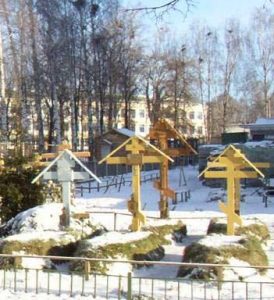 On the first free day after Bright Week [i.e., today], the Church traditionally remembers all those who have fallen asleep. Because of the hope of the resurrection, this is called the “
On the first free day after Bright Week [i.e., today], the Church traditionally remembers all those who have fallen asleep. Because of the hope of the resurrection, this is called the “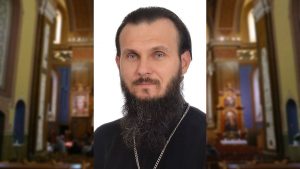 On April 7, 2018, the Holy Father appointed as eparchial bishop of Nyìregyháza [Hungary] Rev. Fr. Ábel Szocska, O.S.B.M., 45, currently apostolic administrator sede vacante of the same eparchy
On April 7, 2018, the Holy Father appointed as eparchial bishop of Nyìregyháza [Hungary] Rev. Fr. Ábel Szocska, O.S.B.M., 45, currently apostolic administrator sede vacante of the same eparchy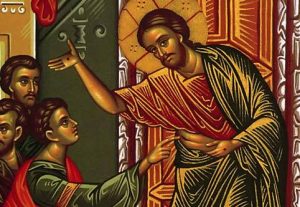 Every day during the week of Easter, called Bright Week by the Church, the paschal services are celebrated in all their splendor. The Easter baptismal procession is repeated daily. The royal gates of the sanctuary remain open. The joy of the Resurrection and the gift of the Kingdom of eternal life continue to abound. Then, at the end of the week, on Saturday evening, the second Sunday after Easter is celebrated in remembrance of the appearance of Christ to the Apostle Thomas “after eight days” (John 20.26).
Every day during the week of Easter, called Bright Week by the Church, the paschal services are celebrated in all their splendor. The Easter baptismal procession is repeated daily. The royal gates of the sanctuary remain open. The joy of the Resurrection and the gift of the Kingdom of eternal life continue to abound. Then, at the end of the week, on Saturday evening, the second Sunday after Easter is celebrated in remembrance of the appearance of Christ to the Apostle Thomas “after eight days” (John 20.26).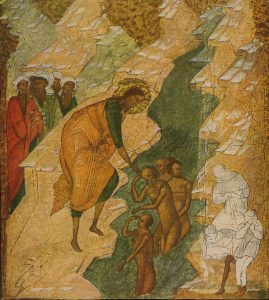 Today is the seventh day of Bright Week, the joyful celebration of the Resurrection of Christ. In today’s Apostolic Reading, St. Peter again proclaims, “The author of life you put to death, but God raised him from the dead; of this we are witnesses” (Acts 3:15). The gospel returns to the theme of baptism, for our life in Christ through the mystery of baptism is the beginning of our share in Christ’s eternal resurrection.
Today is the seventh day of Bright Week, the joyful celebration of the Resurrection of Christ. In today’s Apostolic Reading, St. Peter again proclaims, “The author of life you put to death, but God raised him from the dead; of this we are witnesses” (Acts 3:15). The gospel returns to the theme of baptism, for our life in Christ through the mystery of baptism is the beginning of our share in Christ’s eternal resurrection.